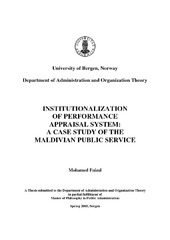Institutionalization of performance appraisal system: A case study of the Maldivian public Service
Master thesis
Permanent lenke
https://hdl.handle.net/1956/1260Utgivelsesdato
2005Metadata
Vis full innførselSamlinger
- Department of Government [457]
Sammendrag
The public sector in most countries is going through profound restructuring in the face of environmental constraints that force the sector to become more efficient and effective. In this respect, one of the most popular tools used in the contemporary reform programme is the application of performance appraisal systems. However, since appraising is considered to be a particularly controversial management practice anywhere it is being practiced, the successful institutionalization of such a system faces numerous challenges and obstacles. The purpose of this study is to explore ‘the degree of institutionalization and how different factors influence the extent of institutionalization of the Performance Appraisal System’ in the Maldivian Public Service. A comparative approach, where the President’s Office and the Public Service Division are selected as the two units of analysis, will be used to find the possible similarities and differences which eventually will be used to make generalizations for the entire public service. In order to carry out this qualitative study, data were collected from different sources including interviews, documents and observations. The study derived its theoretical orientation based on eight independent variables classified into cultural, organizational and political factors that may influence the institutionalization process. The study revealed that the extent to which the appraisal system has been institutionalized in the public service is very low, and although there are many factors inhibiting the institutionalization process, it was the lack of political accountability that appears to be the most important factor. Furthermore, having supportive leaders at the organizational level, formulation of a Public Service Act, provision of valuable rewards and extensive training were also considered important prerequisites that are of necessity for creating a professional public service. The absence of these factors has resulted in the failure to create the appropriate atmosphere needed to fruitfully institutionalize the performance appraisal system.
Utgiver
The University of BergenOpphavsrett
The authorCopyright the author. All rights reserved
